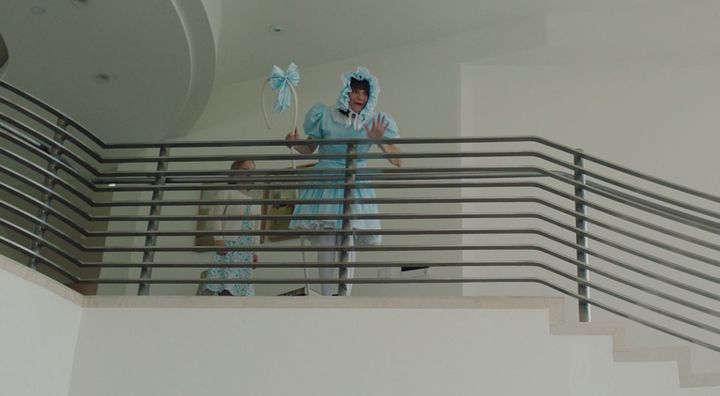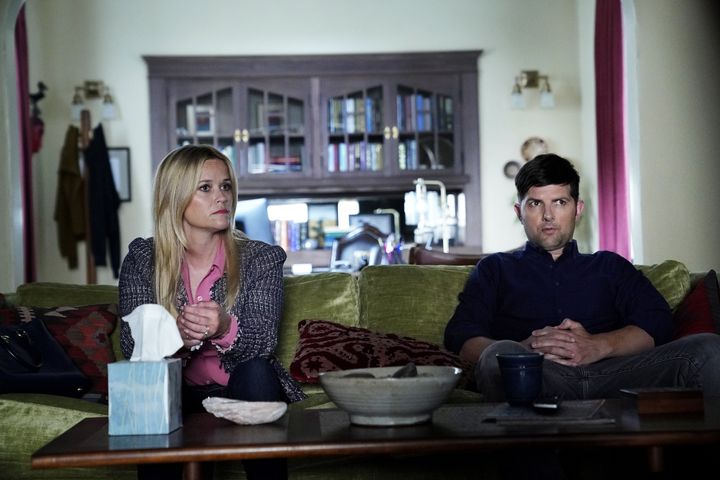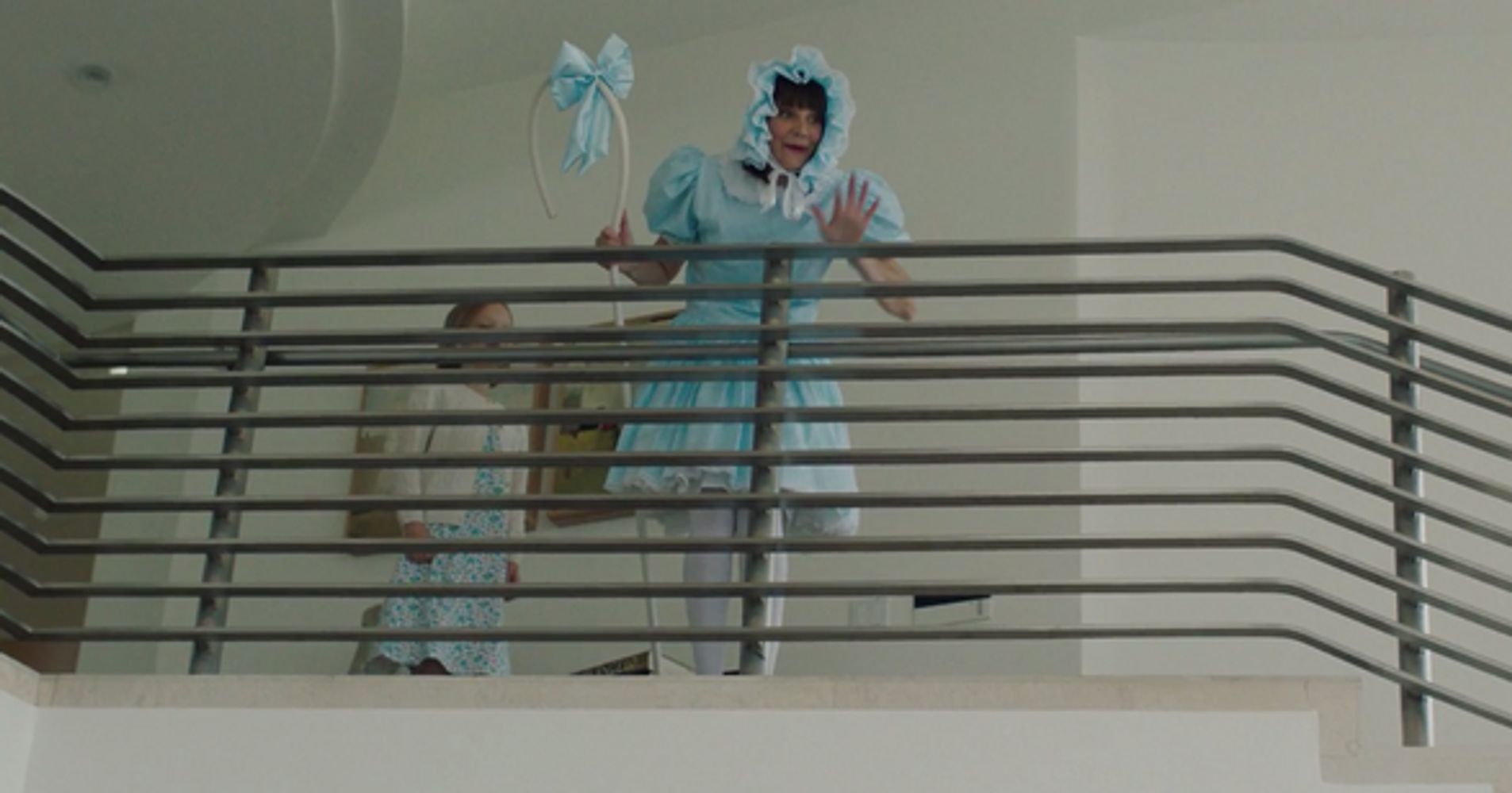[ad_1]
In Season 2, Episode 3 of ”Big Little Lies,” Renata Klein (Laura Dern) hires child psychologist Dr. Little Bo Peep to come speak to her daughter Amabella (Ivy George) after she has a panic attack during a discussion about ”Charlotte’s Web” at school.
“I can’t wait to see you again! I’ll bring tea and crumpets!” the doctor ― costumed and speaking in a ridiculous character voice ― tells a smiling Amabella as they finish their in-home session. Once she’s alone with Renata and her husband, Gordon (Jeffrey Nordling), Dr. Bo Peep takes out her fake teeth and insists that bullying is not the cause of Amabella’s anxiety. No, no. The young girl is terrified that the world is ending after her teacher waxed poetic about how pig Wilbur and spider Charlotte’s relationship boils down to environmental sustainability. (Oh, and of course she senses something is off between her parents, who are fighting after Gordon lost their entire fortune in shady business deals.)
Outcome aside, Dr. Bo Peep would never, ever exist in the real world, according to experts.
“First of all, there is no child therapist who comes in dressed as Little Bo Peep or any other cartoon character,” New York-based psychotherapist Kathryn Smerling, who specializes in couples and family therapy, told HuffPost. “This degrades the efficacy of a play therapist and infantilizes the professional. And, most of all, it is not therapeutically proper. The child then bonds with Little Bo Peep, and not a real person, which is the antithesis of successful play therapy.”

For a series that was championed in the first season for its compelling depiction of therapy, it’s unfortunate to see the second season of “Big Little Lies” step outside the range of common practice to showcase unethical situations. Smerling appreciates seeing psychologists portrayed as “honest active listeners,” while clinical psychologist Andrew Schwehm, who provides evidence-based treatments to adults in Manhattan, added that it can help “lessen the stigma” around therapy and show people what it might look like.
Television shows have long offered a peek into the zen, or zany, offices of psychologists. Among many, we’ve had Frasier Crane (Kelsey Grammer) on “Frasier,” Dr. Edna Keener (Patricia Bethune) on “Mad Men,” Paul Weston (Gabriel Byrne) on “In Treatment,” Justina Jordan (Samira Wiley) on “You’re the Worst” and Marilyn Sanders (Cynthia Nixon) on “The Affair.” But both Schwehm and Smerling singled out “The Sopranos” as accurately depicting their field of work. Seeing Dr. Jennifer Melfi (Lorraine Bracco) chip away at Tony’s (James Gandolfini) anxiety and depression allowed people to connect with the therapeutic process, and perhaps understand that the discomfort of being vulnerable only furthers the healing process. Portrayals like these spark conversations about mental health and create a safe space for people to talk out their feelings or find ways to seek help for themselves.
In the first season of “Big Little Lies,” the productive relationship between victim of domestic abuse Celeste Wright (Nicole Kidman) and Dr. Amanda Reisman (Robin Weigert) was one of the biggest conversation starters. According to Schwehm, their relationship was a solid representation of a doctor-client connection. In Season 1, Episode 5, viewers see Celeste meet Dr. Reisman, her couples therapist, without her husband, Perry (Alexander Skarsgård), with whom she shares a volatile relationship. During this one-on-one, Dr. Reisman urges Celeste to talk about Perry’s violent behavior, even though she’s not yet come to terms with the abuse herself.
“When this violence occurs, have you ever been afraid you might die?” Dr. Reisman asks Celeste, who is clearly shaken by the question yet answers, “Never.” As tears stream down Celeste’s face, Dr. Reisman says, “That must have been terrifying.”
She continues the conversation in a direct way, something Schwehm found “compelling,” as this technique is used among many psychologists who are trying to get their clients to label what exactly is happening to them.
“In many ways, she’s kind of what we try to embody as clinicians,” he said of Dr. Reisman. “People in the media will often use the empathetic side [of therapists], like, ‘Oh, that must’ve been really difficult for you’ or ‘How does that make you feel?’ But what’s often missing in some portrayals, especially those from more than a few years ago, is the directness side of it.”
But whereas Season 1 responsibly portrayed a psychologist’s tactics when dealing with a victim of domestic abuse, Season 2 has seemingly washed that success down the drain. Dr. Reisman still cares for Celeste and her safety, but is no longer a true representative of ethical practices as she tries to erase Celeste’s addiction to Perry’s abusive behavior in the wake of his death, which closed out the first season.
“It’s important for us as therapists to be able to internally check whether caring [about a client] is forcing us to step over our ethical duties to remain objective,” Schwehm said. “In this case, I think that Amanda is really overstepping some of those boundaries.”
For example, Dr. Reisman has Celeste shut her eyes and attempt to relive her trauma, even asking her to imagine Perry abusing her best friend, Madeline (Reese Witherspoon).
“That is nothing I would ever do as a therapist,” Smerling said. Schwehm agreed, saying that Dr. Reisman should be focused on treating Celeste’s post-traumatic stress disorder rather than having her replay the abuse over and over again in her mind.
“Celeste needs to process that her husband was murdered, he was a rapist, he was not the person that she thought he was,” Schwehm said. “On top of that, next would be to get her out of this whole Stockholm syndrome that she’s stuck in as basically being an addict to being abused.”
You see Celeste’s addictive nature on display throughout Season 2, as she daydreams about intimate moments with Perry or masturbates to old videos of him ― despite the violence he inflicted on her. Dr. Reisman recognizes this behavior but doesn’t seem to respect the fact that Celeste is still not aware of her own psychosis. When comparing that to the therapeutic relationship they had in Season 1, Dr. Reisman has lost that empathetic yet direct technique.

Her session with Madeline and her husband, Ed (Adam Scott), is also controversial. Since Madeline plays a role in Celeste’s therapy, it could be considered unethical for Dr. Reisman to accept her as a client.
“If you’re talking about a very rural area — like someone practicing in a small town in Iowa that might have a handful of psychologists — then, yes, that certainly ends up happening. That’s something you have to talk with both clients about to make sure they’re both OK with that relationship,” Schwehm said. “But in a town like Monterey, where I’d assume there are more than enough psychologists to go around, Amanda should have referred Madeline out knowing that that relationship exists.”
Remembering that this is a TV show, which is first and foremost geared at entertaining audiences, something fishy could be going on with “Madame Shrink.” Schwehm believes the shift in her etiquette from Season 1 to Season 2 just doesn’t make sense logically, unless the show is planning on involving her in the investigation surrounding Perry’s death. For now, Detective Adrienne Quinlan (Merrin Dungey) strongly suspects the Monterey Five have something to do with it, so it wouldn’t be unwise to involve Dr. Reisman as she knows personal details about Perry and Celeste’s marriage, as well as Madeline’s.
“I’m interested to see how they handle the legalese of all that ― whether Amanda goes by the book or gives away the information,” Schwehm said.
To keep it close to reality, Dr. Reisman would have to neither confirm nor deny she treats Celeste or Madeline, but she could get subpoenaed for the records. “Then she’d have to alert the client that that’s what’s happening and the client has to give permission to release the records,” Schwehm added. “If they don’t, then the judge can make that order for you to release the records and it just becomes a very, very complicated legal process.”
No matter what happens in the final episodes of “Big Little Lies” Season 2, there’s no denying the psychology of it all has gone downhill. We could chalk it up to Dr. Bo Peep, or we could just blame the writers for apparently never going to therapy. (“I would love to have some of them in my room to hear what their thoughts are,” Schwehm said of the producers.) But the simple fact is when a show is intended to be a limited series, perhaps it should stick to the original plan. Tell me, how do you feel about that?
REAL LIFE. REAL NEWS. REAL VOICES.
Help us tell more of the stories that matter from voices that too often remain unheard.
[ad_2]
Source link

